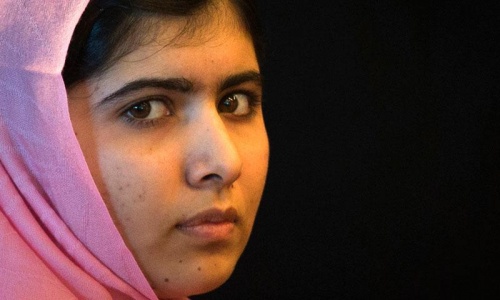ZAATARI CAMP: Malala Yousafzai, a teenage Pakistani activist who came to the international limelight when she was shot by the Taliban said Tuesday that the plight of Syrian refugee children deprived of proper education was a stark reminder of the ''dark days'' Pakistani children under their hard-line rulers.
The 16-year-old rose to prominence in October 2012, when the Taliban tried to kill her for advocating the equality and education of women. She was shot in the head while returning from school in Mingora, the main city of the northwestern Swat valley where militants had a strong base at the time.
She was initially treated in Pakistan, but was later flown to a hospital in Britain, where she now lives with her family.
“My heart broke when I saw Syrian children without proper education, running barefoot in the dusty streets here,” she told The Associated Press after a tour of this sprawling desert camp, home to 120,000 Syrians – Including 50,000 under the age of 16 – displaced in their country's civil war.
“Back home, I saw terrorism with my own eyes. Schools were blasted and children were killed. Now, I see more or less the same in the Syrian conflict. Children are killed and many remain out of school for the past three years.”
About 2.3 million Syrians have fled the three-year old Syrian conflict, seeking shelter in neighboring countries such as Jordan, Lebanon, Turkey and Iraq. At least half of the refugees – 1.1 million – are children. Of those, some 75 per cent are under the age of 12, according to the United Nations refugee agency.
UNHCR says Syrian children are suffering considerably in the war. They are growing up in fractured families, missing out on education as they turn to manual labor, sometimes under dangerous or exploitative conditions.
Many become the main breadwinners of their families. At Zaatari, most of the 680 small shops employ children, according to UNHCR.
There are UN-run schools at Zaatari, as well as recreational facilities, like football fields and playgrounds with swings. But children say they are discouraged from going to school because they have already missed out on education for months and face long walks to reach the locations.
Girls face more restrictions from their largely conservative families which refuse to have them walk around strangers.
Malala visited a Unicef-run playground area and mingled with refugee children — some on swings.
“The world must know about the plight of these innocent people who found themselves refugees the way I did back home,” she said. “Living away from home is very tough.”
Malala said she will campaign for the Syrians abroad. But her immediate plan is to contribute from the New York-based Malala Fund to improve the education of Syrian refugee children and their Jordanian peers who had to “share their bench with their Syrian brothers.”
She said she was planning to hire and pay teachers and renovate an old school in Amman for classes to Syrian refugee boys and separate ones for girls.
During her tour, Malala met Mozon Mleihan, a 16-year-old Syrian refugee girl in Zaatari, and asked her to accompany her.
At the end of the five-hour tour, Mleihan told AP she and Malala “became like sisters.” “I really liked her and I wish I can be brave like her,” said the girl in a headscarf and beaming a smile.













































